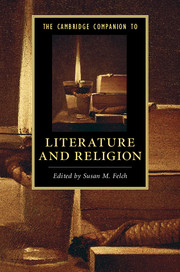Book contents
- Frontmatter
- Epigraph
- Contents
- Notes on Contributors
- Chronology of Religious Founders and Texts
- Introduction
- PART I READING PRACTICES
- PART II INTERSECTIONS
- PART III TRADITIONS
- 9 Hinduism
- 10 Buddhism
- 11 Judaism
- 12 Eastern Orthodoxy
- 13 Roman Catholicism
- 14 Islam
- 15 Protestantism
- 16 World Christianity
- Select Bibliography
- Index
- Miscellaneous Endmatter
13 - Roman Catholicism
from PART III - TRADITIONS
Published online by Cambridge University Press: 05 September 2016
- Frontmatter
- Epigraph
- Contents
- Notes on Contributors
- Chronology of Religious Founders and Texts
- Introduction
- PART I READING PRACTICES
- PART II INTERSECTIONS
- PART III TRADITIONS
- 9 Hinduism
- 10 Buddhism
- 11 Judaism
- 12 Eastern Orthodoxy
- 13 Roman Catholicism
- 14 Islam
- 15 Protestantism
- 16 World Christianity
- Select Bibliography
- Index
- Miscellaneous Endmatter
Summary
Pope Francis dislikes “theist gnosticism.” His biographer notes that, as Archbishop of Buenos Aires, he rejected any “disembodied thinking that in Church terms could be expressed as ‘God without Church, a Church without Christ, Christ without a people.’ Against this elite, ‘airspray theism’ Bergoglio set what he called lo concreto catolico, the ‘concrete Catholic thing,’ which [he insisted] was at the heart of the history and culture of the Latin American people.” Indeed, “the concrete Catholic thing” can be discerned through the whole of Catholic culture. In its varied embodiments over space and time, the Catholic literary imagination remains rooted in the story of the Incarnation, of the God who “became flesh and dwelt among us,” who redeemed humanity within the contours of a particular time and place, who ascended into heaven and remains in relationship through the Church – its sacraments and the mediation of its “great cloud of witnesses,” the saints, both “the living and the dead.” Persistently, Catholic fiction images persons oriented toward sanctity, the universal call to holiness made possible by the Incarnation.
Like all Christians, Catholics affirm the reality of the Triune God who, in an outpouring of interpersonal love, created, redeemed, and sustains all humankind through the event of the Incarnation. However, Catholics understand redemption not solely in the light of Christ's atoning act on the cross but also through the prism of his entire life, as related in the Gospels and discerned in the present. In a first-century epistle, St. John testifies to what the apostles “have heard, what we have seen with our eyes, what we have looked at and touched with our hands, concerning the word of life.” “The world is charged with the glory of God,” writes the Jesuit poet Gerard Manley Hopkins, and this is so not only because God made the world, but because he entered it – born from the body of his mother Mary, raised in a town called Nazareth, and befriended by disciples with whom he spoke, healed, ate, grieved, and rejoiced. The Catholic imagination posits “the priority of Christ” and invites the members of Christ's body, the Church, to “rekindle the Christic imagination” by remembering that God has visited God's people in the most surprising way, “infinity dwindled to infancy.”
- Type
- Chapter
- Information
- The Cambridge Companion to Literature and Religion , pp. 218 - 232Publisher: Cambridge University PressPrint publication year: 2016

